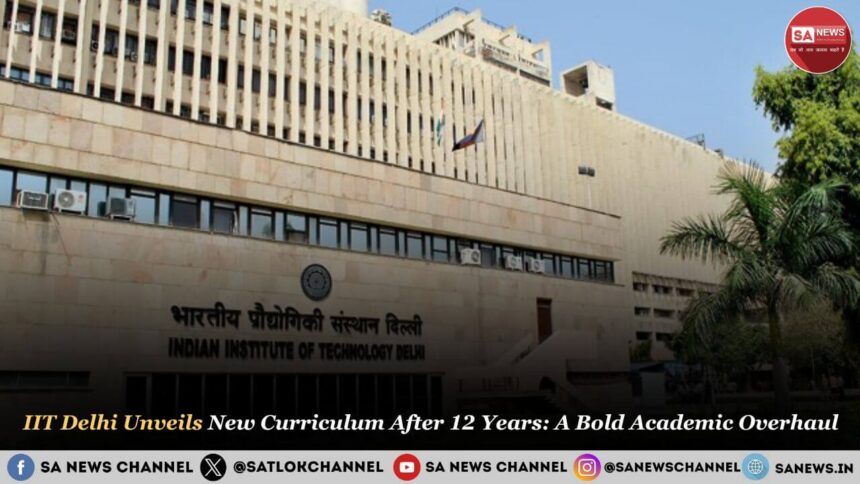In a transformative move in Indian higher education, IIT Delhi has announced a comprehensive overhaul of its academic curriculum the first major revamp in over a decade. Set to launch in the 2025–26 academic year, the redesigned structure aims to introduce greater flexibility, reduce academic pressure, integrate emerging technologies like AI, and align education with global and environmental demands.
A Long-Awaited Transformation
“This change is not just an academic adjustment it’s a philosophical shift in how we educate the engineers and researchers of tomorrow,” said Professor Rangan Banerjee, Director of IIT Delhi. “We want to give students more liberty to explore, innovate, and shape their own educational journeys.”
The overhaul follows 12 years after the last major revision. In the intervening period, AI, sustainability, digital learning, and interdisciplinary collaboration have redefined global academic priorities — themes now central to IIT Delhi’s new model.
Key Changes in the Curriculum
1. Flexible Degree Options

The revamped curriculum introduces five-year dual-degree programs that allow students to seamlessly combine their undergraduate and postgraduate studies. Students will also have the option to pursue minors and specializations across disciplines such as blending engineering with design, or computer science with biology fostering a truly interdisciplinary approach.
2. Reduced Course Load for Better Well-Being
To ease academic pressure, especially on first-year students, IIT Delhi has reduced the number of mandatory credits. Class sizes for core subjects will also be lowered to promote interaction and better comprehension part of a broader initiative to support students’ mental and emotional well-being.
3. AI and Technology Integration

Recognizing AI’s impact on every field, the new curriculum ensures all students, regardless of their major, are trained in foundational AI and digital skills. Courses will leverage AI-based tools for code generation, problem-solving, and research to prepare students for tech-driven environments.
4. Sustainability as a Core Theme
Sustainability is no longer optional it’s embedded across the curriculum. From green infrastructure in civil engineering to low-emission processes in chemical engineering, every department will cultivate environmentally responsible thinking among students.
5. Emphasis on Hands-On Learning
To bridge theory and practice, IIT Delhi is boosting experiential learning. Students will engage in real-world projects, internships, and lab work starting from their first year. This hands-on model is designed to nurture innovation and real-time problem-solving.
Postgraduate Programs: Evolutionary Perspectives
Postgraduate education is also evolving. MTech and MS (Research) students will now undertake mandatory capstone projects and industry internships, with opportunities to collaborate on thesis work with industry or research partners. The goal is to make students more industry-ready and encourage smoother transitions into doctoral research.
Also Read: Delhi Pollution: Delhiites Are Ready to Fight with the ‘Red Light On-Gaadi Off’ Campaign
New Academic Offerings
Three new degree programs debut in the upcoming academic year:
- BTech in Design: A fusion of engineering with aesthetics and creativity. Admission via JEE Advanced and UCEED.
- BS in Chemistry: IIT Delhi’s first standalone undergraduate chemistry program, geared towards research and applied science.
- MTech in Photonics: A cutting-edge course for students focused on optical and photonic technologies. Entry via GATE or equivalent tests.
These additions reflect IIT Delhi’s growing emphasis on innovation, creativity, and interdisciplinary relevance.
Collaborative and Inclusive Development Process
This academic reform is the result of a multi-year consultation process initiated in 2022. The curriculum framework was shaped through dialogues with faculty, students, alumni, industry professionals, and international academic institutions.
“This curriculum is the product of thousands of hours of deliberation,” said Dr. Sunita Narayan, a faculty member involved in the reform. “It represents empowered discussions about what the world expects from our graduates and the vision our students have for themselves.”
Future of Learning
With this bold initiative, IIT Delhi is not just reacting to the future it’s helping define it. The curriculum is designed to be more than a list of courses; it’s a blueprint for building ethical leaders, innovators, and responsible global citizens.
In an era demanding adaptability, purpose, and multidimensional thinking, IIT Delhi’s academic overhaul positions it as a leader in redefining higher education in India.
Blending Knowledge and Consciousness
IIT Delhi’s academic transformation goes beyond institutional reform it hints at a deeper awakening. As the new curriculum promotes self-directed learning, ethics, and holistic growth, it aligns with the teachings of Tatavdarshi Sant Rampal Ji Maharaj, who advocates that true education should lead not only to material success but also to spiritual awareness and liberation.
According to Sant Rampal Ji, real knowledge empowers individuals to live morally and seek inner peace not just to earn degrees. In this light, IIT Delhi’s new curriculum could be seen not only as an academic milestone but also as a step toward cultivating a more conscious and balanced generation
To learn more about the deeper purpose of human life and to gain true spiritual wisdom backed by all holy scriptures, we encourage you to download the Sant Rampal Ji Maharaj App today.
Available on Google Play Store and Apple App Store, the app offers free spiritual discourses, sacred books like Gyan Ganga, daily satsang updates, and much more.
IIT Delhi Unveils New Curriculum After 12 Years about FAQs
1. What major change has IIT Delhi introduced in 2025–26?
IIT Delhi has implemented a comprehensive curriculum overhaul to promote flexibility, reduce academic stress, and integrate AI and sustainability across all programs.
2. What is the main goal behind reducing the course load?
To ease academic pressure and support students’ mental and emotional well-being, particularly in the foundational years.
3. How does the new curriculum address technological advancements?
All students, regardless of discipline, will receive foundational training in AI and digital technologies, making them better prepared for modern industry demands.
4. What new academic programs are being launched?
BTech in Design, BS in Chemistry, and MTech in Photonics each focused on future-forward, interdisciplinary learning.
5. How does the new curriculum promote holistic development?
By emphasizing flexibility, ethics, sustainability, hands-on learning, and emotional well-being, the curriculum aims to produce not just skilled professionals, but socially and spiritually conscious individuals.









